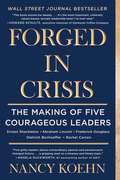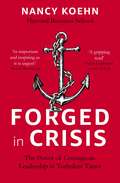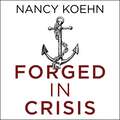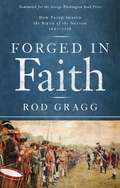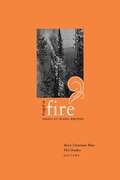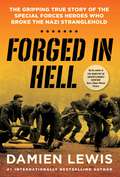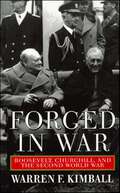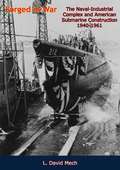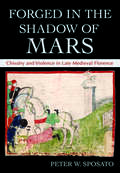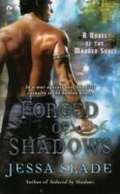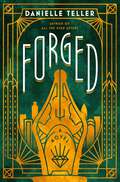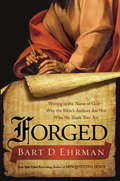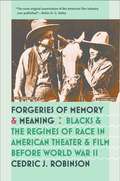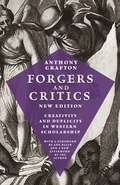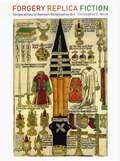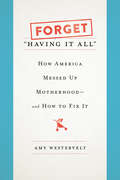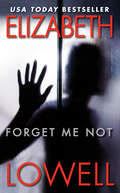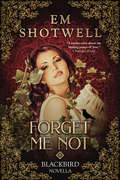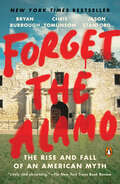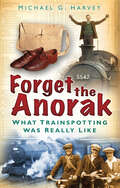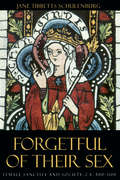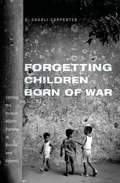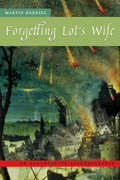- Table View
- List View
Forged in Crisis: The Making of Five Courageous Leaders
by Nancy KoehnA WALL STREET JOURNAL BESTSELLER &“Five gritty leaders whose extraordinary passion and perseverance changed history…a gripping read on a timeless and timely topic&” —Angela Duckworth, #1 bestselling author of Grit An enthralling historical narrative filled with critical leadership insights, Forged in Crisis, by celebrated Harvard Business School historian Nancy Koehn, spotlights five masters of crisis: polar explorer Ernest Shackleton; President Abraham Lincoln; legendary abolitionist Frederick Douglass; Nazi-resisting clergyman Dietrich Bonhoeffer; and environmental crusader Rachel Carson.What do such disparate figures have in common? Why do their extraordinary stories continue to amaze and inspire? In delivering the answers to those questions, Nancy Koehn offers a remarkable template by which to judge those in our own time to whom the public has given its trust. She begins each of the book&’s five sections by showing her protagonist on the precipice of a great crisis: Shackleton marooned on an Antarctic ice floe; Lincoln on the verge of seeing the Union collapse; escaped slave Douglass facing possible capture; Bonhoeffer agonizing over how to counter absolute evil with faith; Carson racing against the cancer ravaging her in a bid to save the planet. The narrative then reaches back to each person&’s childhood and shows the individual growing—step by step—into the person he or she will ultimately become. Significantly, as we follow each leader&’s against-all-odds journey, we begin to glean an essential truth: leaders are not born but made. In a book dense with epiphanies, the most galvanizing one may be that the power to lead courageously resides in each of us. Whether it&’s read as a repository of great insight or as exceptionally rendered human drama, Forged in Crisis stands as a towering achievement.
Forged in Crisis: The Power of Courageous Leadership in Turbulent Times
by Nancy KoehnFrom a brilliant historian at the Harvard Business School, here is a masterful, in-depth portrait of five extraordinary figures-Ernest Shackleton, Abraham Lincoln, Frederick Douglass, Dietrich Bonhoeffer, and Rachel Carson-that illuminates how great leaders are made in times of adversity and the diverse skills they summon in order to prevail.Ten years in the writing, Forged in Crisis, by renowned Harvard Business School historian and Davos and Aspen Institute speaker Nancy Koehn, presents five remarkable life journeys-those of polar explorer Ernest Shackleton; President Abraham Lincoln; legendary abolitionist Frederick Douglass; Nazi-resisting clergyman Dietrich Bonhoeffer; and environmental crusader Rachel Carson. What do such disparate figures have in common? Why do their stories speak to us so powerfully today?Koehn begins each of the book's five sections by showing her protagonist on the precipice of a great crisis: Shackleton marooned on an Antarctic ice floe with no hope of rescue; Lincoln on the verge of the collapse of the Union; Douglass threatened with a return to enslavement; Bonhoeffer agonizing on what a man of faith should do when faced with absolute evil; Carson racing against the clock-and the cancer ravaging her-in a bid to save the planet. Koehn then reaches back to each person's early years to show the individual blooming into the force he or she would ultimately become. Through their confronting of obstacles, we begin to glean an essential truth: leaders are not born but made, and the power to lead resides in each of us.In a time when the highest offices in the land are occupied by the inexperienced and untested, the great question pressing on all of us is: What set of skills is required to lead in crisis, and can history give us answers? Whether it's read as a repository of great insight or as exceptionally rendered human drama, the riveting Forged in Crisis stands out as a towering achievement.
Forged in Crisis: The Power of Courageous Leadership in Turbulent Times
by Nancy Koehn"A close analysis of five gritty leaders whose extraordinary passion and perseverance changed history . . . a gripping read on a timeless and timely topic!"Angela Duckworth, bestselling author of 'Grit'From a brilliant historian at the Harvard Business School, here is a masterful, in-depth portrait of five extraordinary figures-Ernest Shackleton, Abraham Lincoln, Frederick Douglass, Dietrich Bonhoeffer, and Rachel Carson-that illuminates how great leaders are made in times of adversity and the diverse skills they summon in order to prevail.Ten years in the writing, Forged in Crisis, by renowned Harvard Business School historian and Davos and Aspen Institute speaker Nancy Koehn, presents five remarkable life journeys-those of polar explorer Ernest Shackleton; President Abraham Lincoln; legendary abolitionist Frederick Douglass; Nazi-resisting clergyman Dietrich Bonhoeffer; and environmental crusader Rachel Carson. What do such disparate figures have in common? Why do their stories speak to us so powerfully today?Koehn begins each of the book's five sections by showing her protagonist on the precipice of a great crisis: Shackleton marooned on an Antarctic ice floe with no hope of rescue; Lincoln on the verge of the collapse of the Union; Douglass threatened with a return to enslavement; Bonhoeffer agonizing on what a man of faith should do when faced with absolute evil; Carson racing against the clock-and the cancer ravaging her-in a bid to save the planet. Koehn then reaches back to each person's early years to show the individual blooming into the force he or she would ultimately become. Through their confronting of obstacles, we begin to glean an essential truth: leaders are not born but made, and the power to lead resides in each of us.In a time when the highest offices in the land are occupied by the inexperienced and untested, the great question pressing on all of us is: What set of skills is required to lead in crisis, and can history give us answers? Whether it's read as a repository of great insight or as exceptionally rendered human drama, the riveting Forged in Crisis stands out as a towering achievement.(P)2017 Simon & Schuster Audio
Forged in Faith: How Faith Shaped the Birth of the Nation 1607-1776
by Rod GraggThe true drama of how faith motivated America&’s Founding Fathers, influenced the Declaration of Independence and inspired the birth of the nation.This fascinating history, based on meticulous research into the correspondence and documentation of the founding fathers leading up to and encompassing the crafting of the Declaration of Independence, sheds light on how the Judeo-Christian worldview motivated America&’s founding fathers, influenced national independence, inspired our foundational documents, and established the American nation. Written with the pacing and drama of an enticing drama, Forged in Faith is crafted for popular appeal with a compelling mix of dramatized story and action-driven narrative, yet with the authenticity and academic verity of historian Rod Gragg.
Forged in Fire: Essays by Idaho Writers
by Mary Clearman Blew Phil DrukerIn these 20 essays Idaho writers describe the role of fire in their lives and experience and their emotional responses to fire in its various forms whether amongst the trees or on the high plateaus, at the banks of rivers, or up against the encroachment of the urban. Along with new writers are prize-winners Kim Barnes ("The Ashes of August") and Robert Coker Johnson ("What I Know of Fire"), signaling a surge of talent is rising from the flames in Idaho. Annotation ©2005 Book News, Inc., Portland, OR (booknews.com)
Forged in Hell: The Gripping True Story of the Special Forces Heroes Who Broke the Nazi Stranglehold
by Damien LewisCombining riveting combat writing with masterful research, award-winning historian and #1 internationally bestselling author Damien Lewis delivers the remarkable true story of Britain&’s infamous, elite Special Air Service (SAS) forces, their legendary commander, and the impossibly daring, historic mission to liberate Europe via the largest invasion fleet ever assembled. July 1943: The largest invasion fleet ever assembled sailed for fortress Europe, aiming to bulldoze its way onto Nazi shores. At its vanguard went a few hundred elite forces soldiers. The Royal Navy warship carrying them—a former passenger ferry transformed for battle—bore the iconic winged dagger emblem carved on its prow, plus the motto &‘Who Dares Wins,&’ painstakingly fashioned with the most rudimentary tools by Sergeant William &‘Bill&’ Deakins, the foremost explosives expert on board and a Royal Engineer by trade. Led by the SAS commander Blair &‘Paddy&’ Mayne, these war-bitten, piratical raiders were tasked with the impossible—to be the first among the fleet—the very tip of the spear—to bludgeon their way through the most heavily defended enemy shoreline, enabling the ensuing forces to follow on. If they succeeded, it would mark the turning point in the war. If they failed, the consequences were unthinkable. Against all odds, outnumbered some fifty-to-one, and facing a ferocious series of cliffside defenses, they would have to dare all as never before. So begins the true story of the SAS&’s incredible mission, an endeavor replete with surprise, shock, action, heroism, and glory, not to mention treachery, dismay—and the longstanding personal aftershocks of brutal and bloody years spent at war.
Forged in War: Roosevelt, Churchill, and the Second World War
by Warren F. KimballWorld War II created the union between Franklin Roosevelt and Winston Churchill, molding it from start to finish, while the partnership itself shaped many of the most significant moments of the war and the peace that followed. Their connection was truly forged in war. Roosevelt and Churchill continue to fascinate both the World War II generation and those who have grown up in the world formed by that struggle. Here is an inside look at their relationship and the politics, strategy, and diplomacy of the British-American alliance. Warren F. Kimball's lively analysis of these larger-than-life figures shows how they were at the same time realists and idealists, consistent and inconsistent, calculating and impulsive. The result is an unforgettable narrative.
Forged in War: The Naval-Industrial Complex and American Submarine Construction 1940-1961
by Gary E. WeirThis book is the first to analyze the partnership between the Navy, industry, and science forged by World War II and responsible for producing submarines in the United States in the period from 1940 through 1961. The naval-industrial complex was not the result of a single historical event. Neither was it a political-economic entity. Instead it was made up of many unique and distinct components, all of which developed simultaneously; each reflected the development, significance, and construction of a particular vessel or technology within its historical context. Together these components emerged from World War II as a network of distinct relationships linked together by the motives of national defense, mutual growth, and profit. None of the major players in the drama planned or predetermined the naval-industrial complex, and it did not conform to the views of any individual or confirm the value of a particular system of management. Instead it grew naturally in response to the political environment, strategic circumstances, and perceived national need, its character defined gradually not only by the demands of international conflict but also by the scores of talented people interested in the problems and possibilities of submarine warfare. Their combined efforts during this short period of time produced remarkable advances in nuclear propulsion, submerged speed, quieting, underwater sound, and weaponry, as well as a greater appreciation within the Navy and the shipbuilding industry for the ocean environment. This book won the Roosevelt Prize for naval history.
Forged in the Shadow of Mars: Chivalry and Violence in Late Medieval Florence
by Peter W. SposatoIn Forged in the Shadow of Mars, Peter W. Sposato traces chivalry's powerful influence on the mentalitè and behavior of a sizeable segment of the elite in late medieval Florence. He finds that the strenuous knights and men-at-arms of the Florentine chivalric elite—a cultural community comprised of men from both traditional and newly emerged elite lineages—embraced a chivalric ideology that was fundamentally martial and violent. Chivalry helped to shape a common identity among these men based on the profession of arms and the ready use of violence against both their peers and those they perceived to be their social inferiors. This violence, often transgressive in nature, was not only crucial to asserting and defending personal, familial, and corporate honor, but was also inherently praiseworthy. In this way, Sposato highlights the sharp differences between chivalry and the more familiar civic ideology of the popolo grasso, the Florentine mercantile and banking elite who came to dominate Florence politically and economically during the thirteenth and fourteenth centuries.As a result, in Forged in the Shadow of Mars, Sposato challenges the traditional scholarly view of chivalry as foreign to the social and cultural landscape of Florence and contests its reputation as a civilizing force. By reexamining the connection between chivalric literature and actual practice and identity formation among historical knights and men-at-arms, he likewise provides an important corrective to assumptions about the nature of elite violence and identity in medieval Italian cities.
Forged of Shadows (Marked Souls, Book #2)
by Jessa SladeTHE WAR BETWEEN GOOD AND EVIL HAS BALED FOR MILLENNIA, WITH THE MARKED SOULS CAUGHT IN THE MIDDLE. BUT THE NEW GIRL DOESN'T PLAY BY THE OLD RULES. Liam Niall never meant to be a leader. Having barely survived the Irish potato famine, he escaped to Chicago, where he lost half his soul and gained a wayward band of demon-possessed warriors. Now, as they face a morphing evil, Liam grows weary and plagued by doubt--until a new weapon falls into his hands. Her name is Jilly Chan. To save her demon-ridden soul, Liam must win her for his battle...and his bed. Waging a one-woman war against threats to the street kids she mentors, Jilly won't be any man's woman or weapon. But Liam--with his hard eyes, soft brogue, and compelling hands--is a danger to both her rebellious independence and her heart. Two halved souls sharing one fierce passion will sear a fresh scar across the city. Who's in danger now?
Forged: A Novel
by Danielle TellerA thrilling and immersive tale of an impoverished woman turned con-artist by the critically acclaimed author of All the Ever AftersIn the Gilded Age, a time of abject poverty and obscene wealth, a desperate and ambitious young woman strikes out for a new life in the rising industrial cities of America. Naive Fanny is thrust into a Darwinian world where she is cast out and preyed upon, but she&’s a survivor and quickly learns from her struggles. Thanks to her close observations of the mercenary actors around her, Fanny discovers the power of illusion and how it can overcome the immutability of social class and the ruthless rules of capitalism. Shedding her past, Fanny embarks on a darkly thrilling transformation. She becomes Kitty Warren—a forger, con artist, and thief. Exploiting the greed and self-regard of the powerful, Kitty builds her own castle in the sky, yet she finds real pleasure and fulfilment elusive, and soon her foundations start to crumble. With schemes more wicked than Jay Gatsby&’s, yet with more humanity than Tom Ripley, Kitty Warren exposes the dark heart of the American dream, making Forged a gripping narrative and a parable for the ages.
Forged: Writing in the Name of God--Why the Bible's Authors Are Not Who We Think They Are
by Bart D. EhrmanIt is often said, even by critical scholars who should know better, that "writing in the name of another" was widely accepted in antiquity. But New York Times bestselling author Bart D. Ehrman dares to call it what it was: literary forgery, a practice that was as scandalous then as it is today. In Forged, Ehrman's fresh and original research takes readers back to the ancient world, where forgeries were used as weapons by unknown authors to fend off attacks to their faith and establish their church. So, if many of the books in the Bible were not in fact written by Jesus's inner circle-but by writers living decades later, with differing agendas in rival communities-what does that do to the authority of Scripture? Ehrman investigates ancient sources to: Reveal which New Testament books were outright forgeries. Explain how widely forgery was practiced by early Christian writers-and how strongly it was condemned in the ancient world as fraudulent and illicit. Expose the deception in the history of the Christian religion. Ehrman's fascinating story of fraud and deceit is essential reading for anyone interested in the truth about the Bible and the dubious origins of Christianity's sacred texts.
Forgeries of Memory and Meaning
by Cedric J. RobinsonCedric J. Robinson offers a new understanding of race in America through his analysis of theater and film of the early twentieth century. He argues that economic, political, and cultural forces present in the eras of silent film and the early "talkies" firmly entrenched limited representations of African Americans.Robinson grounds his study in contexts that illuminate the parallel growth of racial beliefs and capitalism, beginning with Shakespearean England and the development of international trade. He demonstrates how the needs of American commerce determined the construction of successive racial regimes that were publicized in the theater and in motion pictures, particularly through plantation and jungle films. In addition to providing new depth and complexity to the history of black representation, Robinson examines black resistance to these practices. Whereas D. W. Griffith appropriated black minstrelsy and romanticized a national myth of origins, Robinson argues that Oscar Micheaux transcended uplift films to create explicitly political critiques of the American national myth. Robinson's analysis marks a new way of approaching the intellectual, political, and media racism present in the beginnings of American narrative cinema.
Forgers and Critics, New Edition: Creativity and Duplicity in Western Scholarship
by Anthony GraftonThe close links between forgery and criticism throughout historyIn Forgers and Critics, Anthony Grafton provides a wide-ranging exploration of the links between forgery and scholarship. Labeling forgery the “criminal sibling” of criticism, Grafton describes a panorama of remarkable individuals—forgers from classical Greece through the recent past—who produced a variety of splendid triumphs of learning and style, as well as the scholarly detectives who honed the tools of scholarship in attempts to unmask these skillful fakers. In the process, Grafton discloses the extent, the coherence, and the historical interest of two significant and tightly intertwined strands in the Western intellectual tradition.
Forgery and Memory at the End of the First Millennium
by Levi RoachAn in-depth exploration of documentary forgery at the turn of the first millennium Forgery and Memory at the End of the First Millennium takes a fresh look at documentary forgery and historical memory in the Middle Ages. In the tenth and eleventh centuries, religious houses across Europe began falsifying texts to improve local documentary records on an unprecedented scale. As Levi Roach illustrates, the resulting wave of forgery signaled major shifts in society and political culture, shifts which would lay the foundations for the European ancien régime.Spanning documentary traditions across France, England, Germany and northern Italy, Roach examines five sets of falsified texts to demonstrate how forged records produced in this period gave voice to new collective identities within and beyond the Church. Above all, he indicates how this fad for falsification points to new attitudes toward past and present—a developing fascination with the signs of antiquity. These conclusions revise traditional master narratives about the development of antiquarianism in the modern era, showing that medieval forgers were every bit as sophisticated as their Renaissance successors. Medieval forgers were simply interested in different subjects—the history of the Church and their local realms, rather than the literary world of classical antiquity.A comparative history of falsified records at a crucial turning point in the Middle Ages, Forgery and Memory at the End of the First Millennium offers valuable insights into how institutions and individuals rewrote and reimagined the past.
Forgery, Replica, Fiction: Temporalities of German Renaissance Art
by Christopher WoodToday we often identify artifacts with the period when they were made. In more traditional cultures, however, such objects as pictures, effigies, and buildings were valued not as much for their chronological age as for their perceived links to the remote origins of religions, nations, monasteries, and families. As a result, Christopher Wood argues, pre-modern Germans tended not to distinguish between older buildings and their newer replacements, or between ancient icons and more recent forgeries. But Wood shows that over the course of the fifteenth and early sixteenth centuries, emerging replication technologies-- such as woodcut, copper engraving, and movable type-- altered the relationship between artifacts and time. Mechanization highlighted the artifice, materials, and individual authorship necessary to create an object, calling into question the replica's ability to represent a history that was not its own. Meanwhile, print catalyzed the new discipline of archaeological scholarship, which began to draw sharp distinctions between true and false claims about the past. Ultimately, as forged replicas lost their value as historical evidence, they found a new identity as the intentionally fictional image-making we have come to understand as art.
Forget "Having It All": How America Messed Up Motherhood--and How to Fix It
by Amy WesterveltA clear-eyed look at the history of American ideas about motherhood, how those ideas have impacted all women (whether they have kids or not), and how to fix the inequality that exists as a result. After filing a story only two hours after giving birth, and then getting straight back to full-time work the next morning, journalist Amy Westervelt had a revelation: America might claim to revere motherhood, but it treats women who have children like crap. From inadequate maternity leave to gender-based double standards, emotional labor to the "motherhood penalty" wage gap, racist devaluing of some mothers and overvaluing of others, and our tendency to consider women's value only in terms of their reproductive capacity, Westervelt became determined to understand how we got here and how the promise of "having it all" ever even became a thing when it was so far from reality for American women. In Forget "Having It All," Westervelt traces the roots of our modern expectations of mothers and motherhood back to extremist ideas held by the first Puritans who attempted to colonize America and examines how those ideals shifted--or didn't--through every generation since. Using this historical backdrop, Westervelt draws out what we should replicate from our past (bringing back home economics, for example, this time with an emphasis on gender-balanced labor in the home), and what we must begin anew as we overhaul American motherhood (including taking a more intersectional view of motherhood, thinking deeply about the ways in which capitalism influences our views on reproduction, and incorporating working fathers into discussions about work-life balance). In looking for inspiration elsewhere in the world, Westervelt turned not to Scandinavia, where every work-life balance story inevitably ends up, but to Japan where politicians, in an increasingly desperate effort to increase the country's birth rates (sound familiar?), tried to apply Scandinavian-style policies atop a capitalist democracy not unlike America's, only to find that policy can't do much in the absence of cultural shift. Ultimately, Westervelt presents a measured, historically rooted and research-backed call for workplace policies, cultural norms, and personal attitudes about motherhood that will radically improve the lives of not just working moms but all Americans.
Forget Me Not
by Elizabeth LowellThe terrible tragedy Alana Reeves suffered on Wyoming's Broken Mountain has vanished from her memory. Now nothing remains of those six lost days that cost her everything she held dear. But a man has appeared from the shadows of Alana's past -- a rugged outdoorsman who once dwelt in a wounded heart he is now sworn to heal. Like an answered prayer, Rate Winter has come to lead Alana out of the darkness -- and back to the scene of the nightmare she has erased from her mind. Alana must follow him -- for in Rate's powerful arms her fears can be conquered, and through his love hers can be reborn.
Forget Me Not
by Stef Ann HolmA cattle drive is no place for a lady in bows and buttons...unless she's in love with a rancher in denim and rawhide. Love sizzles in this Western romance from USA TODAY bestselling author Stef Ann Holm.Newly independent city girl Josephine Whittaker succeeded in heading West, all on her own. But once she set foot in the crude cow town of Sienna, Wyoming, her first inclination was to board the next train back out--and she would have, if she hadn't lost everything she owned. Suddenly, a job as a ranch cook seemed a good idea--at least it was better than making money as a dance-hall girl. It didn't seem that important if she neglected to tell her new boss that she'd never so much as boiled an egg... J.D. McCall knew from the get-go that a pretty lady in the chuck wagon with a bunch of cowboys meant trouble. But he faced mutiny among his ranch hands if he didn't bring home a cook--and she said fried beef was her specialty. How could he know he'd never want to let her go? J.D.'s own mother had abandoned his father and the harsh frontier life to go back East. Loving Josephine was sure to break his heart...unless this lady proved she had grit, gumption, and what it took to be a cattle rancher's wife--his wife.
Forget Me Not (Blackbird)
by Em ShotwellWar threatens newfound happiness for a matched-up magical couple in this Southern Gothic, new adult fantasy novella prequel to Blackbird Summer.When Rex Somersby&’s family matchmaker sets him up with the famous Evelyn Cadeau, he can&’t believe his luck. Evelyn is the woman with the perfect Gift—the woman every man wants—while Rex&’s own magical ability leaves much to be desired. He travels from Missouri to meet his dream girl in her rural Mississippi home, where Evelyn makes it clear that winning her heart won&’t be an easy task. Good thing farm-boy Rex has never been afraid of a little hard work.Evelyn Cadeau is used to getting her way. As the woman with the most powerful Gift, she knows she can have her pick of anyone she wants. And who she wants is slick, handsome, and off-limits Guy McCallister—not gawky, buttoned-up Rex Somersby. Yet, after an arranged date with Rex takes a dramatic turn, leading to a bottle of wine and sneaking to the creek for a late night skinny dip, she realizes there may be more to by-the-rules Rex than meets the eye. Just as the young couple start to think their family&’s tradition of matchmaking isn&’t quite so backward, Rex is drafted to Vietnam. With war threatening to tear them apart, will love be able to save them? Or will it take a bit of magic?&“Slow-burning and leisurely, this romance captures the charm of small towns and the tension of the late 1960s, allowing its leads to come together at their own pace…. A tender story about the healing power of love.&”—Publishers Weekly
Forget the Alamo: The Rise and Fall of an American Myth
by Bryan Burrough Chris Tomlinson Jason StanfordThree noted Texan writers combine forces to tell the real story of the Alamo, dispelling the myths, exploring why they had their day for so long, and explaining why the ugly fight about its meaning is now coming to a head. <P><P> Every nation needs its creation myth, and since Texas was a nation before it was a state, it's no surprise that its myths bite deep. There's no piece of history more important to Texans than the Battle of the Alamo, when Davy Crockett and a band of rebels went down in a blaze of glory fighting for independence from Mexico, losing the battle but setting Texas up to win the war. However, that version of events, as Forget the Alamo definitively shows, owes more to fantasy than reality. Just as the site of the Alamo was left in ruins for decades, its story was forgotten and twisted over time, with the contributions of Tejanos--Texans of Mexican origin, who fought alongside the Anglo rebels--scrubbed from the record, and the origin of the conflict over Mexico's push to abolish slavery papered over. Forget the Alamo provocatively explains the true story of the battle against the backdrop of Texas's struggle for independence, then shows how the sausage of myth got made in the Jim Crow South of the late nineteenth and early twentieth century. As uncomfortable as it may be to hear, celebrating the Alamo has long had an echo of celebrating whiteness. <P><P> In the past forty-some years, waves of revisionists have come at this topic, and at times have made real progress toward a more nuanced and inclusive story that doesn't alienate anyone. But we are not living in one of those times; the fight over the Alamo's meaning has become more pitched than ever in the past few years, even violent, as Texas's future begins to look more and more different from its past. It's the perfect time for a wise and generous-spirited book that shines the bright light of the truth into a place that's gotten awfully dark. <P><P><b>A New York Times Best Seller</b>
Forget the Anorak: What Trainspotting Was Really Like
by Michael G HarveyMichael Harvey's new book brings to its reader the excitement of trainspotting in the 1950s and 60s, the hobby's heyday. It was the advent of the famous Ian Allan ABC Locospotters books that really gave the hobby the impetus, as they gave transpotters all the information they required. Forget the Anorak sets out to provide the reader with a personal account of what the hobby entailed - teenagers roaming the railways of Britain, sleeping on deserted platforms on porters' trolleys, 'bunking' dimly lit depots and eluding capture, travelling hundreds of miles ona platform ticket, and stink bombs on the Underground. You'll be able to smell the steam, soot and unwashed socks, and taste the boiled egg sandwiches, the chips wrapped in newspaper and the hot jam doughnuts, all washed down with warm Tizer. Illustrated with Michael Harvey's own photographs and a selection of maps, Forget the Anorak will appeal to anyone who experienced the golden days of trainspotting, as well as to anyone interested in the social history of Britain after the Second World War.
Forgetful of Their Sex: Female Sanctity and Society, ca. 500–1100
by Jane Tibbetts SchulenburgIn this remarkable study of over 2,200 female and male saints, Jane Schulenburg explores women's status and experience in early medieval society and in the Church by examining factors such as family wealth and power, patronage, monasticism, virginity, and motherhood. The result is a unique depiction of the lives of these strong, creative, independent-minded women who achieved a visibility in their society that led to recognition of sanctity. "A tremendous piece of scholarship. . . . This journey through more than 2,000 saints is anything but dull. Along the way, Schulenburg informs our ideas regarding the role of saints in the medieval psyche, gender-specific identification, and the heroics of virginity." —Library Journal "[This book] will be a kind of 'roots' experience for some readers. They will hear the voices, haunted and haunting, of their distant ancestors and understand more about themselves." —Christian Science Monitor "This fascinating book reaches far beyond the history of Christianity to recreate the 'herstory' of a whole gender." —Kate Saunders, The Independent
Forgetting Children Born of War: Setting the Human Rights Agenda in Bosnia and Beyond
by R. Charli CarpenterSexual violence and exploitation occur in many conflict zones, and the children born of such acts face discrimination, stigma, and infanticide. Yet the massive transnational network of organizations working to protect war-affected children has, for two decades, remained curiously silent on the needs of this vulnerable population. Focusing specifically on the case of Bosnia-Herzegovina, R. Charli Carpenter questions the framing of atrocity by human rights organizations and the limitations these narratives impose on their response. She finds that human rights groups set their agendas according to certain grievances-the claims of female rape victims or the complaints of aggrieved minorities, for example-and that these concerns can overshadow the needs of others. Incorporating her research into a host of other conflict zones, Carpenter shows that the social construction of rights claims is contingent upon the social construction of wrongs. According to Carpenter, this pathology prevents the full protection of children born of war.
Forgetting Lot's Wife: On Destructive Spectatorship
by Martin HarriesCan looking at disaster and mass death destroy us? Forgetting Lot’s Wife provides a theory and a fragmentary history of destructive spectatorship in the twentieth century. Its subject is the notion that the sight of historical catastrophe can destroy the spectator. The fragments of this history all lead back to the story of Lot’s wife: looking back at the destruction of the cities of Sodom and Gomorrah, she turns into a pillar of salt. This biblical story of punishment and transformation, a nexus of sexuality, sight, and cities, becomes the template for the modern fear that looking back at disaster might petrify the spectator. Although rarely articulated directly,this idea remains powerful in our culture. This book traces some of its aesthetic, theoretical, and ethical consequences. Harries traces the figure of Lot’s wife across media. In extended engagements with examples from twentieth-century theater, film, and painting, he focuses on the theatrical theory of Antonin Artaud, a series of American films, and paintings by Anselm Kiefer. These examples all return to the story of Lot’s wife as a way to think about modern predicaments of the spectator. On the one hand, the sometimes veiled figure of Lot’s wife allows these artists to picture the desire to destroy the spectator; on the other, she stands as a sign of the potential danger to the spectator. These works, that is, enact critiques of the very desire that inspires them.The book closes with an extended meditation on September 11, criticizing the notion that we should have been destroyed by witnessing the events of that day.
